During Google’s infancy, its ranking system was less sophisticated, allowing websites to secure top positions irrespective of content quality or relevance. Exploiting these loopholes birthed what’s known as Black Hat SEO—techniques that manipulate search engine rules for quick wins. These practices, if unrecognized, can inadvertently harm your site’s standing.
The Origins of Black Hat SEO

The SEO realm often categorizes practices into two factions: White Hat and Black Hat. Drawing from Westerns, White Hats symbolize ethical SEO—simple, search engine-approved techniques. Conversely, Black Hats represent unethical strategies aimed at rapid, albeit deceitful, success.
As Google’s algorithms evolved, so did Black Hat strategies. However, frequent updates—500-600 yearly—such as the transformative Google Panda and Penguin, have made gaming the system riskier. While Black Hat tactics can offer short-term gains, they inevitably lead to penalties that could damage your website’s future.
Difference Between Black Hat and White Hat SEO:
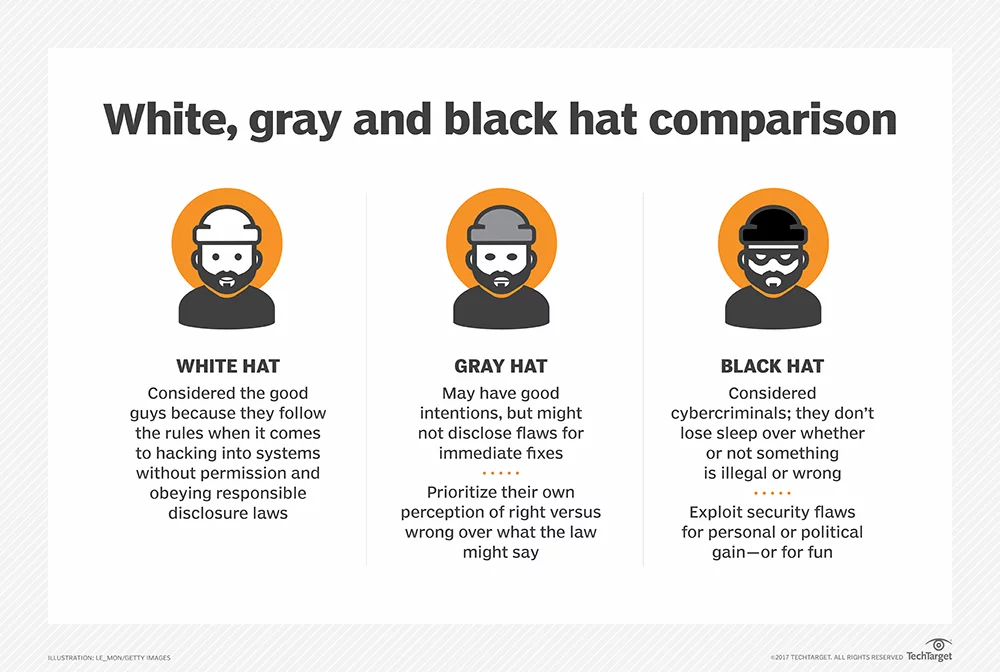
| Black Hat SEO | White Hat SEO |
|---|---|
| Involves aggressive tactics for search engines, not human audience. | Utilizes optimization strategies focusing on human audience, strictly follows search engine rules. |
| Aimed at quick financial returns. | Enhances search performance while maintaining website integrity. |
| Involves keyword stuffing and spamming content. | Conducts thorough research, crafts relevant Meta tags and titles. |
| Relies on irrelevant backlinks. | Acquires links through high-quality content. |
| Engages in link exchanges for ranking. | Prioritizes natural link building. |
| Also known as Unethical SEO. | Also known as Ethical SEO. |
| Used for short-term gains. | Used for long-term growth. |
| Not approved by search engines. | Approved by search engines. |
| Disregards Google’s guidelines. | Follows Google’s guidelines for user experience. |
| Techniques include keyword stuffing, doorway pages, hidden links, and spam comments. | Techniques involve research, content improvement, and adherence to Google’s guidelines. |
| Doesn’t fulfill search intent. | Satisfies search intent. |
| Manipulates algorithms for better results. | Achieves high ranking organically. |
| Degrades user experience. | Enhances user experience. |
| Not focused on high-quality content. | Dedicated to producing high-quality content. |
| Reduces website trustworthiness. | Improves website credibility. |
| Decreases website authority. | Increases website authority. |
| Disapproved by search engines. | Approved by search engines. |
| Contains duplicate content. | Contains relevant content. |
| High risk involved. | Low or zero risk. |
| Contains irrelevant backlinks. | Contains relevant backlinks. |
Strategies of Black SEO that Are Frequently Implemented:
1. Keyword Stuffing
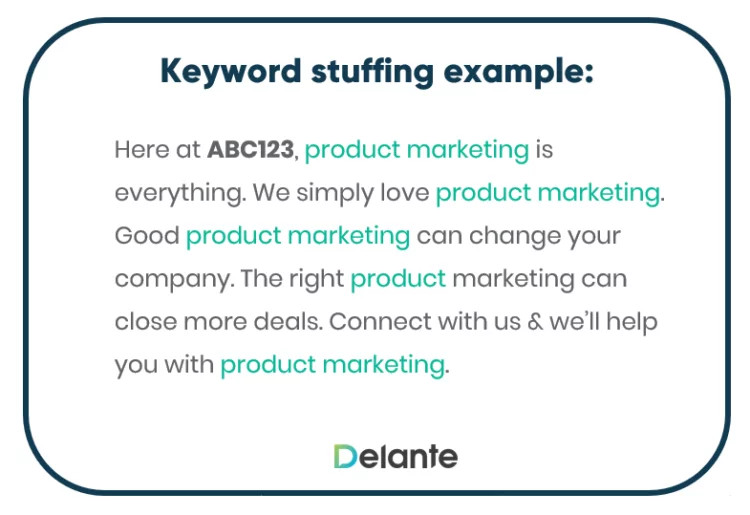
Keyword stuffing is a now-outdated SEO (Search Engine Optimization) technique that involves excessively loading web content with keywords or phrases, often without consideration for readability or context. The primary aim is to manipulate search engine rankings by making the content seem more relevant for specific search queries.
Technique: This strategy involves adding keywords unnaturally and disproportionately throughout a piece of content. It can take the form of repeated insertion of a keyword or phrase within sentences, paragraphs, or even meta tags. The intention is to make the content appear more relevant to search engines for particular queries.
Tools and Implications: There are tools available, such as Yoast SEO, that help in analyzing and maintaining an optimal keyword density within content. They assist in identifying keyword usage and providing suggestions for better optimization. However, exceeding a keyword density of 2-4% is generally considered excessive and can result in penalties from search engines like Google. Penalties might lead to the lowering of search rankings or even removal from search results altogether.
2. Content Repetition
Content Repetition involves duplicating content from various sources, often without proper attribution or acknowledgment. The intent behind this technique can vary, from using content for reference purposes to outright copying for one’s benefit.
Technique: Content Repetition typically involves directly replicating or paraphrasing information from other sources. It might be employed to provide additional context, validate claims, or support arguments within a piece of content. However, when done without proper attribution or citation, it can result in penalties due to duplicate content issues.
“In the world of online marketing, content is king.”
Content Repetition:
Plagiarism Checkers
- Turnitin: Renowned for its comprehensive database, Turnitin compares content against a vast repository, highlighting similarities and potential plagiarism.
- Grammarly: While primarily a grammar checker, Grammarly also features a plagiarism checker that scans text against various online sources.
- Copyscape: Copyscape is a specialized tool dedicated to identifying duplicate content across the web, ensuring content authenticity.
- SmallSEOTools: Offering a free online plagiarism checker, SmallSEOTools allows writers to verify content originality by comparing it against online sources.
Attribution Plugins
- Yoast SEO: A popular WordPress plugin, Yoast SEO not only aids in SEO optimization but also includes features to facilitate proper citation and attribution within content creation.
- Easy Content Attribution Pro: Specifically designed for WordPress, this plugin streamlines the process of attributing sources within content, ensuring ethical citation practices.
Content Management Systems (CMS)
Content Management Systems play a crucial role in content oversight and reference tracking:
- WordPress: WordPress, a widely used CMS, offers plugins and features that enable creators to track content modifications, revisions, and original sources. Plugins like Edit Flow or Revisionary specifically focus on tracking changes and maintaining a record of content references.
3. Content Spam
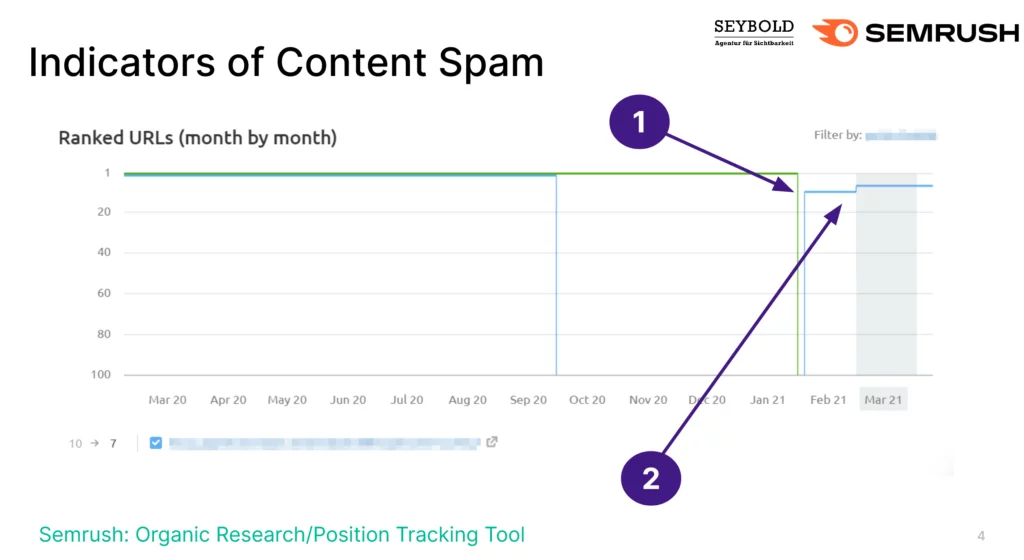
Comment Spam, on the other hand, involves posting irrelevant comments with links for the primary purpose of self-promotion.
Technique: Comment Spamming revolves around the practice of leaving comments on blogs, forums, or social media platforms solely for the purpose of inserting links to one’s own content or website. These comments are often irrelevant to the ongoing discussion or content of the platform and are intended to manipulate search engine rankings by acquiring backlinks.
Comment Spam:
- Anti-Spam Plugins: Many CMS platforms have plugins designed to combat comment spam. For instance, Akismet for WordPress effectively filters out spam comments by using algorithms that analyze content and prevent irrelevant or suspicious comments from appearing on websites.
- CAPTCHA and Verification Plugins: Adding CAPTCHA verification or other human verification plugins to comment sections can deter automated bots from posting spammy comments with links.
- Moderation Tools: CMS platforms often include comment moderation features that allow administrators to review and approve comments before they are publicly visible. Tools like Disqus or Facebook Comments also provide moderation functionalities.
4. Questionnable Guest Blogging
Questionable Guest Blogging refers to a strategy adopted by individuals or businesses where they craft guest posts intended for websites that either lack relevance or possess low-quality content. The primary objective behind this approach is to amass backlinks rather than focusing on delivering substantive and beneficial content to the hosting site’s audience. The core aim here is to bolster search engine rankings through link acquisition, prioritizing this over content quality and relevance.
For instance, an individual running a technology-oriented blog might engage in questionable guest blogging by submitting guest posts to sites completely unrelated to technology, such as fashion or lifestyle blogs. Within these guest posts, they incorporate links directing back to their technology-focused site. This practice disregards the alignment of content with the interests and expectations of the hosting site’s audience. Instead, it aims solely at securing backlinks, irrespective of the coherence or value the content offers to the hosting platform.
Tools like Moz Link Explorer, Ahrefs, and SEMrush serve as invaluable resources for website owners to scrutinize and evaluate their backlink profiles. These tools play a crucial role in meticulously examining the quality and contextual relevance of acquired backlinks. By leveraging these tools, website owners can ascertain the credibility and suitability of the sources from which their backlinks originate. This helps in ensuring that the obtained backlinks are not only reputable but also align with the thematic relevance of their own website or content.
5. Internal Broken Links:
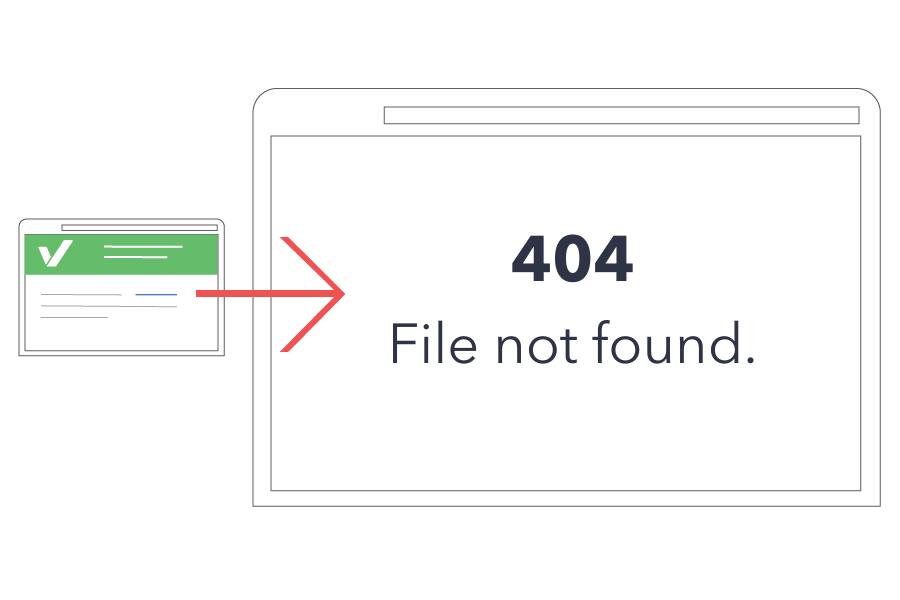
Internal Broken Links are hyperlinks embedded within a website that have ceased to function or lead users to outdated or non-existent pages. These broken links disrupt the user experience by directing visitors to pages that either no longer exist or fail to provide the expected content. Reasons for these broken links can stem from content removal, website restructuring without updating links, or inadequate regular maintenance of website content.
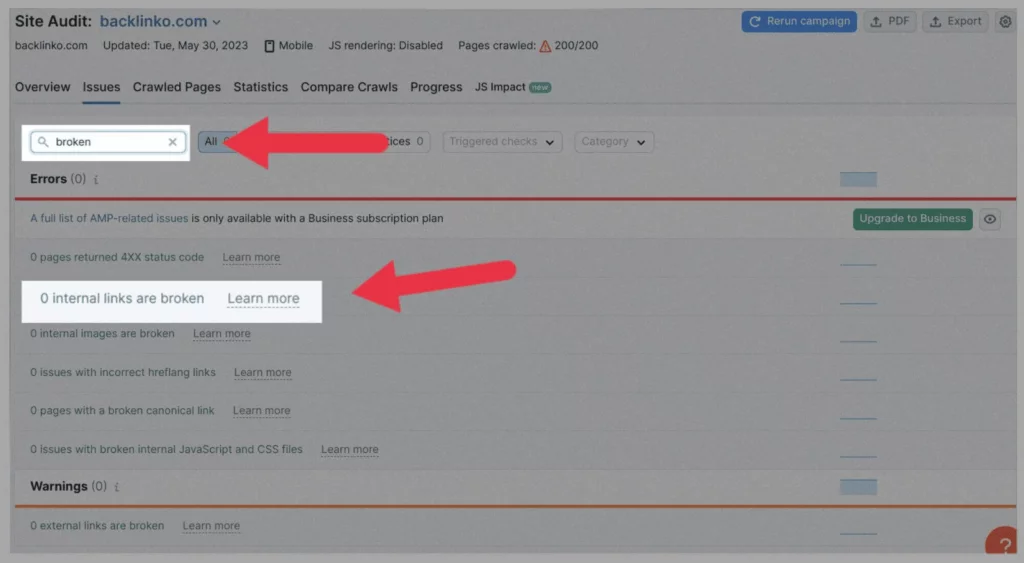
For instance, a visitor navigating a website may encounter internal links that direct them to pages showing 404 error messages or content that is obsolete, causing frustration and a negative perception of the site’s reliability and upkeep.
Tools and Plugins:
Several tools and plugins assist website owners in identifying and addressing Internal Broken Links, ensuring a seamless browsing experience for users:
- Screaming Frog: This tool conducts a comprehensive website crawl, detecting broken links and generating detailed reports that pinpoint where these broken links are located within the site structure. It provides valuable insights for site owners to rectify these issues promptly.
- Google Search Console: Google Search Console offers a “Crawl Errors” report that identifies broken internal links within a website. It provides specific details on URLs that encounter errors, empowering site owners to resolve these issues efficiently.
- Broken Link Checker for WordPress(for WordPress): Specifically designed for WordPress users, this plugin scans a website for broken links and missing images, generating reports and notifications for site owners to swiftly fix these issues directly from the WordPress dashboard.
How Successful Companies Faced Backlash of Black Hat SEO:
1. BMW’s Search Result Manipulation: A Cautionary Tale of Black Hat SEO

In 2006, BMW, a leading automobile manufacturer, employed aggressive tactics to exploit search engine algorithms for its benefit. They manipulated search results by redirecting users searching for the term “used car” to their website. This Black Hat maneuver was an attempt to boost their site’s visibility and attract traffic, capitalizing on a loophole in search engine algorithms prevalent at that time.
The Black Hat Backfire
However, this strategy did not go unnoticed by Google’s vigilant algorithms. When Google identified the manipulation, it swiftly took action to penalize BMW for violating its guidelines. As a consequence, Google removed BMW’s website entirely from search listings for a duration of three days.
Impact on BMW’s Online Presence
The repercussions of this penalty were substantial. During the three-day suspension, BMW experienced a significant loss in traffic. An estimated 71 thousand hits were deprived during this period, impacting the brand’s online visibility, potential customer engagement, and ultimately, its revenue stream.
Lessons Learned
BMW’s experience serves as a stark warning against employing Black Hat SEO practices. While the short-term gains might seem enticing, the long-term repercussions of such unethical strategies can severely harm a brand’s reputation, online presence, and customer trust.
Resources and Further Reading:
- Google’s Guidelines: Google’s Webmaster Guidelines outline best practices for websites to ensure they meet search engine standards.
- Impact of Black Hat SEO: Understanding the potential impact of Black Hat SEO can guide businesses to adopt ethical practices. Impact of Black Hat SEO provides insights into its consequences.
- Importance of Ethical SEO: Delving into the importance of ethical SEO practices can help businesses prioritize long-term success. Why Ethical SEO Matters by Forbes Councils emphasizes the significance of ethical strategies.
BMW’s misstep with Black Hat SEO serves as a cautionary tale, highlighting the need for ethical SEO practices to sustain a brand’s credibility and online presence in the ever-evolving digital landscape.
2. Rap Genius and the Pitfalls of Black Hat SEO
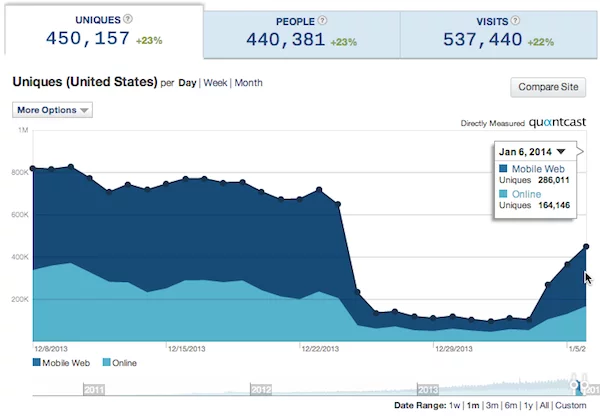
The case of Rap Genius, a platform offering annotated lyrics and music annotations, stands as a stark reminder of the consequences of employing Black Hat SEO tactics. Rap Genius resorted to manipulative strategies, artificially promoting links across multiple platforms in a bid to enhance its search engine rankings.
The Black Hat Misstep
In an attempt to game the system and swiftly boost their visibility, Rap Genius engaged in link manipulation, a Black Hat SEO practice. By artificially generating links across various platforms without genuine relevance or value, they sought to inflate their search engine rankings.
Google’s Swift Response
However, Google’s algorithms are adept at detecting manipulative behavior aimed at exploiting search engine rankings. Upon identifying Rap Genius’s Black Hat tactics, Google took immediate action to downgrade the platform’s ranking.
Impact on Rap Genius
The repercussions were significant. Google’s penalty had the potential to cause Rap Genius a substantial loss of an estimated 3.8 million hits. This sharp decline in visibility and traffic served as a stark reminder of the perils associated with attempting to deceive search engine algorithms.
Insights and Further Reading:
- Google’s Algorithm Updates: Understanding Google’s updates and algorithms is crucial for website optimization. Explore Google’s Search Algorithm Updates to comprehend its impact on search results.
- Ethical Link Building: Exploring ethical link-building strategies can guide businesses towards sustainable SEO practices. Dive into Effective Link Building Strategies by Backlinko for insights.
- Avoiding Black Hat Tactics: Articles like Common Black Hat SEO Techniques by Ahrefs provide an in-depth look into Black Hat practices and their risks.
3. eBay’s Enigmatic Encounter with Google’s Penalties
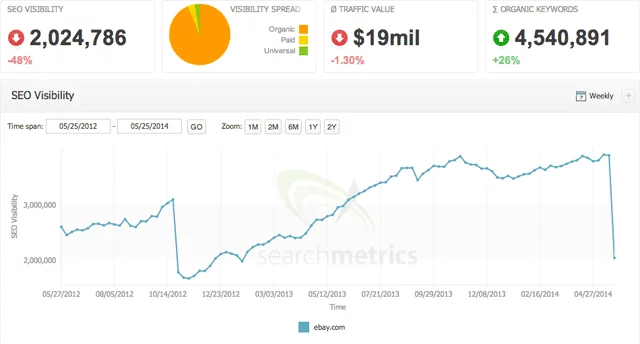
The incident involving eBay, a global e-commerce powerhouse, sheds light on the unforeseen consequences of Black Hat SEO strategies. Despite its prominence, eBay found itself entangled in the web of Google’s penalties due to alleged infractions associated with manipulative SEO tactics.
The Unraveling of eBay’s Ranking
eBay encountered a sudden and perplexing drop in its search engine rankings, signaling a blow to its online visibility and potentially affecting its revenue streams. What compounded the issue was Google’s imposition of a manual penalty on eBay’s website.
Lack of Clarity in Penalties
What made eBay’s case particularly confounding was the absence of a transparent explanation from Google regarding the specific violations that led to the penalty. This lack of explicit communication regarding the infractions posed a significant challenge for eBay to rectify its SEO strategies and regain lost ground in search rankings.
Impact on eBay’s Online Presence
The penalty risked a substantial loss in traffic, potentially depriving eBay of over 6 million hits during the period of penalty. This sharp decline in visibility and customer reach posed significant threats to eBay’s online dominance, revenue, and brand reputation.
Insights and Further Reading:
- Google Penalties: Understanding Google’s penalties and how to recover from them is crucial for businesses. Explore Google Penalties and Recovery for insights.
- SEO Best Practices: Familiarizing oneself with ethical SEO guidelines is essential to avoid penalties. Google’s Webmaster Guidelines provide essential best practices.
- Case Studies on Google Penalties: Dive into case studies highlighting instances of Google penalties and their impact on businesses. Google Penalty Recovery Case Studies by Search Engine Journal offers valuable insights.
Embracing Ethical White Hat SEO: A Path to Sustainable Success
In the dynamic realm of digital marketing, the adoption of ethical White Hat SEO practices emerges as a cornerstone for establishing a robust and enduring online presence. Unlike the short-term gains promised by Black Hat strategies, ethical SEO approaches prioritize authenticity, user experience, and compliance with search engine guidelines.
Understanding White Hat SEO
White Hat SEO refers to legitimate optimization techniques that align with search engine guidelines, aiming to enhance a website’s visibility organically. These strategies prioritize user satisfaction, quality content creation, and adherence to ethical standards set by search engines.
Long-Term Viability of Ethical SEO:
- Sustainable Growth: White Hat SEO, while requiring patience and dedication to yield results, establishes enduring effects. By prioritizing the creation of valuable content, engaging users, and fostering genuine link building, businesses lay a strong foundation for sustainable growth. Though the results may take time, they are more likely to be stable and long-lasting.
- Credibility and Trust: Ethical SEO practices are instrumental in building trust and credibility among users and search engines alike. Offering valuable, relevant content that meets user expectations cultivates trust, leading to increased user engagement, reduced bounce rates, and higher conversion rates. This trust forms the bedrock for sustained relationships with both users and search engines.
- Adaptability to Algorithm Changes: Ethical strategies equip websites to navigate and adapt to the dynamic landscape of algorithm updates. Rather than fearing sudden drops in rankings due to algorithm changes, websites adhering to ethical SEO principles are better equipped to withstand these alterations. They can adjust their strategies more effectively without compromising their integrity.
Importance of Ethical Strategies:
- Avoiding Penalties: Ethical SEO practices ensure adherence to search engine guidelines, mitigating the risk of penalties and unforeseen drops in rankings. Maintaining compliance safeguards a website’s credibility and helps avoid potential bans or suspensions that could severely impact online visibility and reputation.
- Enhanced User Experience: Prioritizing user experience through high-quality, relevant content encourages visitor retention and return visits. This focus on user satisfaction results in higher engagement metrics, fostering a loyal and engaged audience base.
- Building Brand Reputation: Ethical SEO contributes significantly to shaping a positive brand image. Consistently delivering valuable and authentic content helps businesses cultivate a strong brand reputation, nurturing trust and loyalty among their audience. This positive reputation forms a crucial element in the sustained success and growth of a brand.
Conclusion: Learning and Adopting Ethical Strategies
Have you inadvertently applied any of these strategies? Reflecting on their consequences can drive home the importance of ethical SEO practices. By sharing your experiences, you contribute to fostering a community dedicated to authentic and ethical digital practices.
While Black Hat SEO may promise immediate results, it jeopardizes a website’s longevity and credibility. Investing in White Hat SEO practices—authentic, organic optimization—ensures sustainable growth despite evolving search engine algorithms.
Resisting the allure of quick gains, genuine White Hat SEO, and robust Inbound Marketing strategies prove worth the effort. Although White Hat results may take time, they endure and provide a solid foundation for online success.
In the ever-evolving landscape of SEO, prioritizing ethical strategies ensures resilience, credibility, and long-term success, paving the way for a sustainable online presence.
FAQs on Black Hat SEO:
How do penalties from search engines impact a business’s online presence?
Penalties result in reduced visibility, decreased website traffic, and damaged brand reputation. Being removed or downgraded in search results limits a business’s reach and negatively affects its credibility.
Can businesses recover from the impacts of Black Hat SEO?
Yes, recovery is possible by ceasing unethical practices, implementing ethical SEO strategies, and following search engine guidelines. However, it might take time to regain lost trust and visibility.
What are the long-term consequences of engaging in Black Hat SEO?
Long-term consequences include persistent penalties, a tarnished brand image, difficulty in rebuilding trust with users and search engines, and prolonged setbacks in regaining lost rankings.
How can businesses prevent the negative impacts of Black Hat SEO?
Businesses can avoid Black Hat SEO by prioritizing ethical practices, creating valuable content, focusing on user experience, and staying updated with search engine guidelines.
What steps should businesses take if they’ve been penalized for Black Hat SEO practices?
Businesses should immediately cease unethical tactics, conduct a comprehensive SEO audit, rectify violations, submit reconsideration requests to search engines, and focus on implementing ethical SEO strategies.



